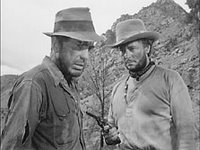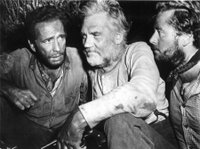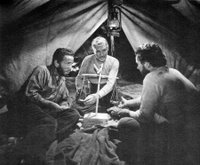everyone has a right to a Hollywood kiss
 If they want one. After all my talk, I saw Brokeback Mountain. To review:
If they want one. After all my talk, I saw Brokeback Mountain. To review:Before seeing the film myself, I saw it, through Anthony Lane's descriptions in his New Yorker review, as all about the stoic endurance of repression. My interpretation of the "we're not looking at one another" promotional image followed this same argument. My original thoughts on Lane's review, here. Brokeback Thoughts, Part 1.
I think the argument is still valid. For the first 5 minutes of the film. The scene outside the trailer is pure classical Hollywood in which the two romantic leads avoid each others glances, pace around the space, etc. It's an intro film rule that you can get the whole plot of a classical Hollywood film from the first 5 minutes . . . And the scene outside the trailer does not appear in the short story and it has almost no dialog. So it is essentially "cinematic" and it does set the tone, but not for long . . .
Before I saw the film, and based on Lane's review, I had imagined that the movie "ended" around the time Michelle Williams saw the boys kissing, shut the door and stayed in the marriage. Repressive indeed.
But when I actually saw the movie, I thought that the story really took off when all the other family and friends got involved. Jack's amazing wife, Jack's parents, Ennis's girlfriend, Ennis's daughters, Ennis's wife's new husband, Jack's father in law . . . The cruelty and tragedy of all of those interactions makes clear the violent consequences of living in a repressive culture. I didn't expect the movie to be as explicitly critical as it was, more so than Lane's review and other reviews I'd heard.
I also thought that Jack's insistance on his right to a stable, long-term romantic and economic partnership and Ennis's insistance on his right to a family were interesting, and very political, elements of the film. Jack and Ennis aren't radical "we're here, we're queer and we don't have fucking children" - they are in a Hollywood movie, and that means liberal, not radical politics.
***
 At this critical juncture, we are slowly reading the short story in bed at night and we're not finished yet (used my New Yorker archive for the first time), but in the scene between Ennis, Jack and Mrs. Ennis both Ennis and Mrs. Ennis know that's she's caught the boys kissing in the stairwell. That means that in the story he and she know what she's seen, but in the film, he doesn't know that she's seen. All of this seeing and not seeing and looking and not looking is very classical Hollywood.
At this critical juncture, we are slowly reading the short story in bed at night and we're not finished yet (used my New Yorker archive for the first time), but in the scene between Ennis, Jack and Mrs. Ennis both Ennis and Mrs. Ennis know that's she's caught the boys kissing in the stairwell. That means that in the story he and she know what she's seen, but in the film, he doesn't know that she's seen. All of this seeing and not seeing and looking and not looking is very classical Hollywood. And I think the cliche of the fishing trip on which no fish are caught is a funny joke (turned tragic) in which the film tells the same little story I did: that which we have learned is heterosexual masculinity (the fishing trip without fish) is actually queer masculinity playing straight.
And I thought the dramatic and narrative parallels to Treasure of the Sierra Madre were quite obvious and the use of the Western genre a deliberate attempt to tell the story about Hollywood masculinity using Hollywood conventions.
But if Hollywood has historically represented queerness through various codes, the queer characters here are allowed to speak and love without entirely coding their identities as straight, but still coding them as Hollywood in a lot of ways.
All this bears on my Brokeback Thoughts, Part 2, here. On Heath and the Golden Globes, Etc.
***
 And I think I would have preferred the first violent image, of the murdered old man, have been a little less restricted in its possible meanings. That is to say, I would have liked some ambiguity about who saw it, or in whose mind it was real . . . something more like that amazing scene in Persona that you don't see . . . though I think making the scene visible to the audience is important here. I would have liked to imagine that both Jack and Ennis had "seen" and remembered seeing that violence. And then Jack's romantic idealism would have been in the face of and despite the reality of repressive violence and Ennis's tragic pragmatism would have been another response to the same reality. But that comes across in any case and the image is ambiguous and disturbing enough, though it looked a little like the cliched personal, psychological "backstory" Lane is so hard on in his recent 2006 omnibus review. Because for god's sake, it's not a personal backstory, it's a national backstory.
And I think I would have preferred the first violent image, of the murdered old man, have been a little less restricted in its possible meanings. That is to say, I would have liked some ambiguity about who saw it, or in whose mind it was real . . . something more like that amazing scene in Persona that you don't see . . . though I think making the scene visible to the audience is important here. I would have liked to imagine that both Jack and Ennis had "seen" and remembered seeing that violence. And then Jack's romantic idealism would have been in the face of and despite the reality of repressive violence and Ennis's tragic pragmatism would have been another response to the same reality. But that comes across in any case and the image is ambiguous and disturbing enough, though it looked a little like the cliched personal, psychological "backstory" Lane is so hard on in his recent 2006 omnibus review. Because for god's sake, it's not a personal backstory, it's a national backstory. By the end of the film I was bawling (not unusual) and I think it was the effect of seeing a romantic relationship, and various gender identities, and various sex acts NOT usually given the Hollywood treatment, given the Hollywood treatment.
Photos: Treasue of the Sierra Madre (John Huston, 1946) is the story of 3 men: Dobbs (Bogart), Curtain (Tim Holt) and their older guide (Walter Huston) and THEY plan to shoot the man (a fourth man, not pictured) who discovers their illicit camp. FYI, "illicit camp" is not a play on words . . . Although I secretly, fleetingly hoped that Jack and Ennis would kill Aguirre (Quaid) violence doesn't pay and in Sierra Madre they all wind up dead, alone, or married to each others sweethearts.
Categories: distress/anguish, interest/excitement, visual, literary, newyorker, film

0 Comments:
Post a Comment
<< Home